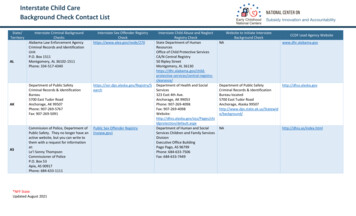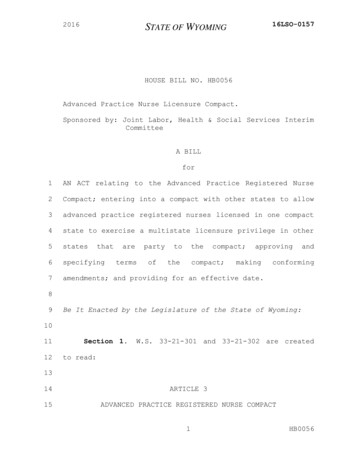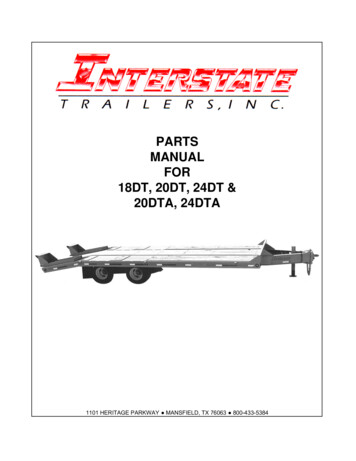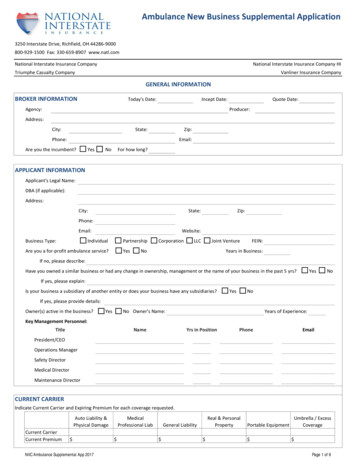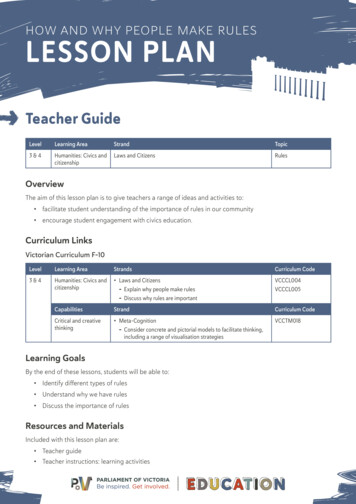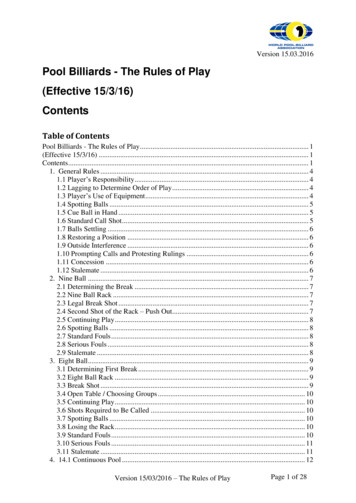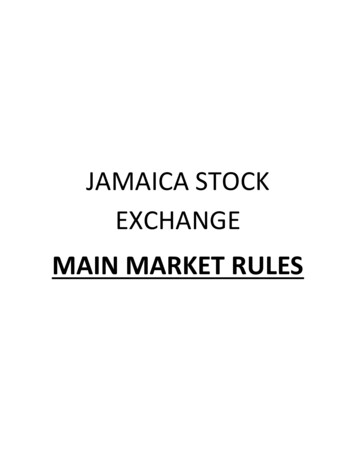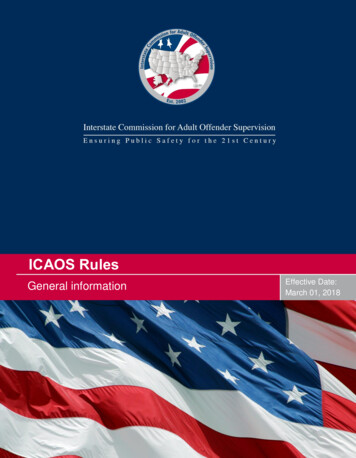
Transcription
ICAOS RulesGeneral informationEffective Date:March 01, 2018
IntroductionThe Interstate Commission for Adult Offender Supervision is charged withoverseeing the day-to-day operations of the Interstate Compact for Adult OffenderSupervision, a formal agreement between member states that seeks to promote publicsafety by systematically controlling the interstate movement of certain adult offenders. Asa creature of an interstate compact, the Commission is a quasi-governmental administrativebody vested by the states with broad regulatory authority. Additionally, the InterstateCompact for Adult Offender Supervision has congressional consent under Article I, § 10of the United States Constitution and pursuant to Title 4, Section 112(a) of the UnitedStates Code.Through its rulemaking powers, the Commission seeks to achieve the goals of thecompact by creating a regulatory system applicable to the interstate movement of adultoffenders, provide an opportunity for input and timely notice to victims of crime and to thejurisdictions where offenders are authorized to travel or to relocate, establish a system ofuniform data collection, provide access to information on active cases to authorizedcriminal justice officials, and coordinate regular reporting of Compact activities to headsof state councils, state executive, judicial, and legislative branches and criminal justiceadministrators. The Commission is also empowered to monitor compliance with theinterstate compact and its duly promulgated rules, and where warranted to initiateinterventions to address and correct noncompliance. The Commission will coordinatetraining and education regarding regulations of interstate movement of offenders for stateofficials involved in such activity.These rules are promulgated by the Interstate Commission for Adult OffenderSupervision pursuant to Article V and Article VIII of the Interstate Compact for AdultOffender Supervision. The rules are intended to effectuate the purposes of the compactand assist the member states in complying with their obligations by creating a uniformsystem applicable to all cases and persons subject to the terms and conditions of thecompact. Under Article V, Rules promulgated by the Commission “shall have the forceand effect of statutory law and shall be binding in the compacting states[.]” All stateofficials and state courts are required to effectuate the terms of the compact and ensurecompliance with these rules. To the extent that state statutes, rules or policies conflict withthe terms of the compact or rules duly promulgated by the Commission, such statutes, rulesor policies are superseded by these rules to the extent of any conflict.To further assist state officials in implementing the Compact and complying withits terms and these rules, the Commission has issued a number of advisory opinions.Additionally, informal opinions can be obtained from the Commission as warranted.Advisory opinions, contact information and other important information, can be found onthe Commission’s website at http://www.interstatecompact.org.
INTRODUCTION1CHAPTER 1 DEFINITIONS5Rule 1.101 Definitions. 5CHAPTER 2 GENERAL PROVISIONS10Rule 2.101 Involvement of interstate compact offices . 10Rule 2.102 Data collection and reporting [Expired; See history] . 11Rule 2.103 Dues formula . 12Rule 2.104 Forms . 13Rule 2.105 Misdemeanants. 14Rule 2.106 Offenders subject to deferred sentences . 15Rule 2.107 Offenders on furlough, work release . 16Rule 2.108 Offenders with disabilities . 17Rule 2.109 Adoption of rules; amendment . 18Rule 2.110 Transfer of offenders under this compact . 21CHAPTER 3 TRANSFER OF SUPERVISION22Rule 3.101 Mandatory transfer of supervision . 22Rule 3.101-1 Mandatory reporting instructions and transfers of military, families of military, familymembers employed, employment transfer, and veterans for medical or mental health services . 24Rule 3.101-2 Discretionary transfer of supervision . 26Rule 3.101-3 Transfer of supervision of sex offenders . 27Rule 3.102 Submission of transfer request to a receiving state. 28Rule 3.103 Reporting instructions; offender living in the receiving state at the time of sentencing orafter disposition of a violation or revocation proceeding . 30Rule 3.104 Time allowed for investigation by receiving state . 32Rule 3.104-1 Acceptance of offender; issuance of reporting instructions . 33Rule 3.105 Pre-release transfer request . 34Rule 3.106 Request for expedited reporting instructions . 352
Rule 3.107 Transfer request . 36Rule 3.108 Victim notification. 37Rule 3.108-1 Victims’ right to be heard and comment . 38Rule 3.109 Waiver of extradition . 39CHAPTER 4 SUPERVISION IN RECEIVING STATE40Rule 4.101 Manner and degree of supervision in receiving state . 40Rule 4.102 Duration of supervision in the receiving state . 41Rule 4.103 Conditions of supervision . 42Rule 4.103-1 Force and effect of conditions imposed by a receiving state . 43Rule 4.104 Offender registration or DNA testing in receiving or sending state . 44Rule 4.105 Arrival and departure notifications; withdrawal of reporting instructions . 45Rule 4.106 Progress reports on offender compliance and non-compliance . 46Rule 4.107 Fees . 47Rule 4.108 Collection of restitution, fines and other costs . 48Rule 4.109 Violation reports requiring retaking . 49Rule 4.109-1 Authority to arrest and detain . 50Rule 4.109-2 Absconding Violation . 51Rule 4.110 Transfer to a subsequent receiving state . 52Rule 4.111 Offenders returning to the sending state . 53Rule 4.112 Closing of supervision by the receiving state. 54CHAPTER 5 RETAKING55Rule 5.101 Discretionary retaking by the sending state . 55Rule 5.101-1 Pending felony or violent crime charges . 56Rule 5.101-2 Discretionary process for disposition of violation in the sending state for a new crimeconviction . 57Rule 5.102 Mandatory retaking for a new felony or new violent crime conviction . 58Rule 5.103 Offender behavior requiring retaking . 593
Rule 5.103-1 Mandatory retaking for offenders who abscond . 60Rule 5.103-2 Mandatory retaking for violent offenders and violent crimes [REPEALED] . 61Rule 5.104 Cost of retaking an offender . 62Rule 5.105 Time allowed for retaking an offender . 63Rule 5.106 Cost of incarceration in receiving state . 64Rule 5.107 Officers retaking an offender. 65Rule 5.108 Probable cause hearing in receiving state . 66Rule 5.109 Transport of offenders . 68Rule 5.110 Retaking offenders from local, state or federal correctional facilities . 69Rule 5.111 Denial of bail or other release conditions to certain offenders . 70CHAPTER 6 DISPUTE RESOLUTION AND INTERPRETATION OF RULES 71Rule 6.101 Informal communication to resolve disputes or controversies and obtain interpretation ofthe rules. 71Rule 6.102 Formal resolution of disputes and controversies . 72Rule 6.103 Enforcement actions against a defaulting state . 73Rule 6.104 Judicial Enforcement . 754
Chapter 1 DefinitionsRule 1.101 DefinitionsAs used in these rules, unless the context clearly requires a different construction“Abscond” means to be absent from the offender’s approved place of residence oremployment and avoiding supervision.“Adult” means both individuals legally classified as adults and juveniles treated as adultsby court order, statute, or operation of law.“Application fee” means a reasonable sum of money charged an interstate compactoffender by the sending state for each application for transfer prepared by thesending state.“Arrival” means to report to the location and officials designated in reporting instructionsgiven to an offender at the time of the offender’s departure from a sending stateunder an interstate compact transfer of supervision.“Behavior Requiring Retaking” means an act or pattern of non-compliance withconditions of supervision that could not be successfully addressed through the useof documented corrective action or graduated responses and would result in arequest for revocation of supervision in the receiving state.“By-laws” means those by-laws established by the Interstate Commission for AdultOffender Supervision for its governance, or for directing or controlling theInterstate Commission’s actions or conduct.“Compact” means the Interstate Compact for Adult Offender Supervision.“Compact administrator” means the individual in each compacting state appointedunder the terms of this compact and responsible for the administration andmanagement of the state’s supervision and transfer of offenders subject to the termsof this compact, the rules adopted by the Interstate Commission for Adult OffenderSupervision, and policies adopted by the State Council under this compact.“Compact commissioner” or “commissioner” means the voting representative of eachcompacting state appointed under the terms of the Interstate Compact for AdultOffender Supervision as adopted in the member state.“Compliance” means that an offender is abiding by all terms and conditions ofsupervision, including payment of restitution, family support, fines, court costs orother financial obligations imposed by the sending state.5
“Deferred sentence” means a sentence the imposition of which is postponed pending thesuccessful completion by the offender of the terms and conditions of supervisionordered by the court.“Detainer” means an order to hold an offender in custody.“Discharge” means the final completion of the sentence that was imposed on an offenderby the sending state.“Extradition” means the return of a fugitive to a state in which the offender is accused, orhas been convicted of, committing a criminal offense, by order of the governor ofthe state to which the fugitive has fled to evade justice or escape prosecution.References:ICAOS Dispute Resolution2-2004 [Offenders not transferred through the ICAOS must be returned through theextradition clause of the U.S. Constitution]“Offender” means an adult placed under, or made subject to, supervision as the result ofthe commission of a criminal offense and released to the community under thejurisdiction of courts, paroling authorities, corrections, or other criminal justiceagencies, and who is required to request transfer of supervision under the provisionsof the Interstate Compact for Adult Offender Supervision.References:ICAOS Advisory Opinion9-2004 [CSL offenders seeking transfer of supervision are subject to ICAOS-New Jersey]“Plan of supervision” means the terms under which an offender will be supervised,including proposed residence, proposed employment or viable means of supportand the terms and conditions of supervision.“Probable cause hearing” a hearing in compliance with the decisions of the U.S. SupremeCourt, conducted on behalf of an offender accused of violating the terms orconditions of the offender’s parole or probation.“Receiving state” means a state to which an offender requests transfer of supervision oris transferred.6
“Relocate” means to remain in another state for more than 45 consecutive days in any 12month period.References:ICAOS Advisory Opinion4-2012 [‘Relocate’ does not appear to limit the cumulative number of days within whichan offender may be permitted to remain in another state to a total of 45 cumulativedays during the same 12 month period.]“Reporting instructions” means the orders given to an offender by a sending or receivingstate directing the offender to report to a designated person or place, at a specified dateand time, in another state. Reporting instructions shall include place, date, and time onwhich the offender is directed to report in the receiving state.“Resident” means a person who—(1) has continuously inhabited a state for at least 1 year prior to the commission ofthe offense for which the offender is under supervision; and(2) intends that such state shall be the person’s principal place of residence; and(3) has not, unless incarcerated or on active military deployment, remained inanother state or states for a continuous period of 6 months or more with the intentto establish a new principal place of residence.“Resident family” means a parent, grandparent, aunt, uncle, adult child, adult sibling,spouse, legal guardian, or step-parent who-(1) has resided in the receiving state for 180 calendar days or longer as of the dateof the transfer request; and(2) indicates willingness and ability to assist the offender as specified in the plan ofsupervision.“Retaking” means the act of a sending state in physically removing an offender, or causingto have an offender removed, from a receiving state.“Rules” means acts of the Interstate Commission, which have the force and effect of lawin the compacting states, and are promulgated under the Interstate Compact forAdult Offender Supervision, and substantially affect interested parties in additionto the Interstate Commission.“Sending state” means a state requesting the transfer of an offender, or which transferssupervision of an offender, under the terms of the Compact and its rules.“Sex offender” means an adult placed under, or made subject to, supervision as the resultof the commission of a criminal offense and released to the community under thejurisdiction of courts, paroling authorities, corrections, or other criminal justiceagencies, and who is required to register as a sex offender either in the sending orreceiving state and who is required to request transfer of supervision under theprovisions of the Interstate Compact for Adult Offender Supervision.7
“Shall” means that a state or other actor is required to perform an act, the non-performanceof which may result in the imposition of sanctions as permitted by the InterstateCompact for Adult Offender Supervision, its by-laws and rules.“Subsequent receiving state” means a state to which an offender is transferred that is notthe sending state or the original receiving state.“Substantial compliance” means that an offender is sufficiently in compliance with theterms and conditions of his or her supervision so as not to result in initiation ofrevocation of supervision proceedings by the sending state.References:ICAOS Advisory Opinion7-2004 [determining “substantial compliance when there are pending charges in areceiving state]“Supervision” means the oversight exercised by authorities of a sending or receiving stateover an offender for a period of time determined by a court or releasing authority,during which time the offender is required to report to or be monitored bysupervising authorities, and to comply with regulations and conditions, other thanmonetary conditions, imposed on the offender at the time of the offender’s releaseto the community or during the period of supervision in the community.References:ICAOS Advisory Opinions9-2004 [CSL offenders released to the community under the jurisdiction of the Courts]8-2004 [Suspended sentence requiring payment of monitored restitution]3-2005 [Requirement to complete a treatment program as a condition of supervision]3-2010 & 4-2010 [Offenders not subject to supervision by corrections may be subject toICAOS if reporting to the courts is required.]“Supervision fee” means a fee collected by the receiving state for the supervision of anoffender.“Temporary travel permit” means, for the purposes of Rule 3.108 (b), the writtenpermission granted to an offender, whose supervision has been designated a “victimsensitive” matter, to travel outside the supervising state for more than 24 hours butno more than 31 calendar days. A temporary travel permit shall include a startingand ending date for travel.“Travel permit” means the written permission granted to an offender authorizing theoffender to travel from one state to another.8
“Victim” means a natural person or the family of a natural person who has incurred director threatened physical or psychological harm as a result of an act or omission of anoffender."Victim-sensitive" means a designation made by the sending state in accordance with itsdefinition of “crime victim” under the statutes governing the rights of crime victimsin the sending state. The receiving state shall give notice of offender’s movementto the sending state as specified in Rules 3.108 and 3.108-1.“Violent Crime” means any crime involving the unlawful exertion of physical force withthe intent to cause injury or physical harm to a person; or an offense in which aperson has incurred direct or threatened physical or psychological harm as definedby the criminal code of the state in which the crime occurred; or the use of a deadlyweapon in the commission of a crime; or any sex offense requiring registration.“Waiver” means the voluntary relinquishment, in writing, of a known constitutional rightor other right, claim or privilege by an offender.“Warrant” means a written order of the court or authorities of a sending or receiving stateor other body of competent jurisdiction which is made on behalf of the state, orUnited States, issued pursuant to statute and/or rule and which commands lawenforcement to arrest an offender. The warrant shall be entered in the NationalCrime Information Center (NCIC) Wanted Person File with a nationwide pick-upradius with no bond amount set.History: Adopted November 3, 2003, effective August 1, 2004; “Compliance” amended October 26, 2004,effective January 1, 2005; “Resident” amended October 26, 2004, effective January 1, 2005; “Residentfamily” amended October 26, 2004, effective January 1, 2005; “Substantial compliance” adopted October26, 2004, effective January 1, 2005; “Supervision” amended October 26, 2004, effective January 1, 2005;“Travel permit” amended September 13, 2005, effective January 1, 2006; “Victim” amended September13, 2005, effective January 1, 2006; “Relocate” adopted September 13, 2005, effective January 1, 2006;“Compact” adopted September 13, 2005, effective January 1, 2006; “Resident” amended September 13,2005, effective January 1, 2006; “Relocate” amended October 4, 2006, effective January 1, 2007; “Sexoffender” adopted September 26, 2007, effective January 1, 2008.; “Supervision” amended November 4,2009, effective March 1, 2010. “Warrant” adopted October 13, 2010, effective March 1, 2011; “ViolentCrime” adopted October 13, 2010, effective March 1, 2011; “Violent Offender” adopted October 13, 2010,effective March 1, 2011; “Resident” amended September 14, 2011, effective March 1, 2012; “ViolentOffender” amended September 14, 2011, effective March 1, 2012; “Abscond” amended August 28, 2013,effective March 1, 2014; “Resident Family” amended August 28, 2013, effective March 1, 2014;“Temporary Travel Permit” amended August 28, 2013, effective March 1, 2014; “Warrant” amendedAugust 28, 2013, effective March 1, 2014; “Violent Offender” repealed August 28, 2013, effective March1, 2014; “Behavior Requiring Retaking” adopted September 14, 2016, effective June 1, 2017; “SignificantViolation” repealed September 14, 2016, effective June 1, 2017; “Special Condition” repealed September14, 2016, effective June 1, 2017.9
Chapter 2 General ProvisionsRule 2.101 Involvement of interstate compact offices(a) Acceptance, rejection or termination of supervision of an offender under this compact shallbe made only with the involvement and concurrence of a state’s compact administrator orthe compact administrator's designated deputies.(b) All formal written, electronic, and oral communication regarding an offender under thiscompact shall be made only through the office of a state’s compact administrator or thecompact administrator's designated deputies.(c) Transfer, modification or termination of supervision authority for an offender under thiscompact may be authorized only with the involvement and concurrence of a state’scompact administrator or the compact administrator's designated deputies.(d) Violation reports or other notices regarding offenders under this compact shall betransmitted only through direct communication of the compact offices of the sendingand receiving states.History: Adopted November 3, 2003, effective August 1, 2004.10
Rule 2.102 Data collection and reporting [Expired; See history](a) As required by the compact, and as specified by the operational procedures and formsapproved by the commission, the states shall gather, maintain and report data regardingthe transfer and supervision of offenders supervised under this compact.(b)(1) Each state shall report to the commission each month the total number of offenderssupervised under the compact in that state.(2) Each state shall report to the commission each month the numbers of offenderstransferred to and received from other states in the previous month.(3) Reports required under Rule 2.102 (b)(1) and (2) shall be received by thecommission no later than the 15th day of each month.(c) This Rule will not expire until the Electronic Information System approved by thecommission is fully implemented and functional.History: Adopted November 3, 2003, effective August 1, 2004; amended September 14, 2005, effectiveDecember 31, 2005. On November 4, 2009, the commission found that the electronic information systemin (c) is fully implemented and functional, and ordered that this rule expire, effective December 31, 2009.11
Rule 2.103 Dues formula(a) The commission shall determine the formula to be used in calculating the annualassessments to be paid by states. Public notice of any proposed revision to the approveddues formula shall be given at least 30 calendar days prior to the Commission meetingat which the proposed revision will be considered.(b) The commission shall consider the population of the states and the volume of offendertransfers between states in determining and adjusting the assessment formula.(c) The approved formula and resulting assessments for all member states shall bedistributed by the commission to each member state annually.(d)(1) The dues formula is the—(Population of the state divided by Population of the United States) plus(Number of offenders sent from and received by a state divided by Totalnumber of offenders sent from and received by all states) divided by 2.(2) The resulting ratios derived from the dues formula in Rule 2.103 (d)(1) shall beused to rank the member states and to determine the appropriate level of dues to bepaid by each state under a tiered dues structure approved and adjusted by theCommission at its discretion.History: Adopted November 3, 2003, effective August 1, 2004; amended August 28, 2013, effective March1, 2014.12
Rule 2.104 Forms(a) States shall use the forms or electronic information system authorized by thecommission.(b) Section (a) shall not be construed to prohibit written, electronic or oral communicationbetween compact offices.History: Adopted November 3, 2003, effective August 1, 2004; amended September 26, 2007, effectiveJanuary 1, 2008; amended November 4, 2009, effective March 1, 2010; amended October 11, 2017,effective March 1, 2018.13
Rule 2.105 Misdemeanants(a) A misdemeanor offender whose sentence includes 1 year or more of supervision shallbe eligible for transfer, provided that all other criteria for transfer, as specified in Rule3.101, have been satisfied; and the instant offense includes 1 or more of the following—(1) an offense in which a person has incurred direct or threatened physical orpsychological harm;(2) an offense that involves the use or possession of a firearm;(3) a 2nd or subsequent misdemeanor conviction of driving while impaired by drugs oralcohol;(4) a sexual offense that requires the offender to register as a sex offender in the sendingstate.References:ICAOS Advisory Opinion4-2005 [Misdemeanant offender not meeting criteria of 2.105 may be transferred underRule 3.101-2, discretionary transfer]7-2006 [There are no exceptions to applicability of (a)(3) based on either the time periodbetween the first and subsequent offense(s) or the jurisdiction in which theconvictions occurred]16-2006 [If the law of the sending state recognizes the use of an automobile as an elementin an assault offense and the offender is so adjudicated, Rule 2.105 (a)(1) applies]2-2008 [Based upon the provisions of the ICAOS rules, offenders not subject to ICAOSmay, depending on the terms and conditions of their sentences, be free to moveacross state lines without prior approval from the receiving state and neitherjudges nor probation officers are prohibited by ICAOS from allowing suchoffenders to travel from Texas to another state]1-2011 [All violations involving the use or possession of a firearm, including hunting, aresubject to Compact transfer.]History: Adopted November 3, 2003, effective August 1, 2004; amended March 12, 2004; amendedOctober 26, 2004, effective January 1, 2005; amended October 7, 2015, effective March 1, 2016.14
Rule 2.106 Offenders subject to deferred sentencesOffenders subject to deferred sentences are eligible for transfer of supervision under thesame eligibility requirements, terms, and conditions applicable to all other offenders underthis compact. Persons subject to supervision pursuant to a pre-trial release program, bail,or similar program are not eligible for transfer under the terms and conditions of thiscompact.References:ICAOS Advisory OpinionsJune 30, 2004 [Determining eligibility should be based on legal actions of a court ratherthan legal definitions]6-2005 [Deferred prosecution may be equivalent to deferred sentence if a finding or pleaof guilt has been entered and all that is left is for the
the terms of the compact or rules duly promulgated by the Commission, such statutes, rules or policies are superseded by these rules to the extent of any conflict. To further assist state officials in implementing the Compact and complying with its terms and these rules, the Commission has issued a number of advisory opinions.
